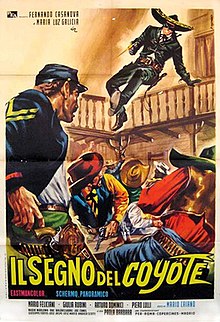The Sign of the Coyote
The Sign of the Coyote (Italian: Il segno del coyote) is a 1963 Italian-Spanish western adventure film directed by Mario Caiano and starring Fernando Casanova, María Luz Galicia and Jesús Tordesillas.[1]
| The Sign of the Coyote | |
|---|---|
 | |
| Directed by | Mario Caiano |
| Produced by | Aldo U. Passalacqua Norberto Soliño |
| Written by | Mario Caiano José Mallorquí |
| Starring | Fernando Casanova María Luz Galicia Jesús Tordesillas |
| Music by | Francesco De Masi Manuel Parada |
| Cinematography | Aldo Greci Ricardo Torres |
| Edited by | Renato Cinquini |
Production company | Copercines, Cooperativa Cinematográfica Hispamer Films Produzioni Europee Associate |
| Distributed by | Exclusivas Floralva Distribución |
Release date | 11 May 1963 |
Running time | 80 minutes |
| Country | Italy Spain |
| Language | Italian |
The film's sets were designed by the art director Piero Filippone.
Synopsis
Following the Conquest of California, a local adventurer battles against the new American authorities and their unjust actions against the people.
Cast
- Fernando Casanova as César de Echagüe / El Coyote
- María Luz Galicia as Leonora Acevedo
- Jesús Tordesillas as Don Cesar's Father
- Fernando Sancho as Lugones Brother
- José Jaspe as Lugones Brother
- Fernando Hilbeck as Joaquim Gallardo
- Félix Fernández as Don Goyo
- Paola Barbara as Mme Teodora Acevedo
- Mario Feliciani as Governor Parker
- Giulia Rubini as Beatrice
- Arturo Dominici as Judge Clemens
- Giuseppe Fortis as Wilkes
- Piero Lulli as Lenny
- Andrea Scotti as Don Goyo's Son
- Maruja Tamayo as Carmen de Echague
- José Marco as Captain Grey
- Miguel del Castillo as Julian
- Santiago Rivero as Dr. Valdez
- Alfonso Rojas as Sergeant Hogg
- José Villasante as Ciudadano
- Antonio Padilla as Lenny Henchman
- Luis Rivera as Medico Capitan
- Maria Carmen Encalado as Rocio
- Nadia Marlowa as Lupita
- Raf Baldassarre as Lenny Henchman
- Joe Kamel as Hernando Lugones
gollark: Turns out the password to the server is `password`, so I SSHed in and edited the ROM.
gollark: Yes. I managed to install potatOS on all computers and shut them down.
gollark: Give all phones and stuff viewing windows in the back so the electrons stay in the right place.
gollark: Just watch the electrons ***reaallly*** closely.
gollark: In that case, clearly the solution is to destroy quantum physics
References
- Ercolani p.130
Bibliography
- Eugenio Ercolani. Darkening the Italian Screen: Interviews with Genre and Exploitation Directors Who Debuted in the 1950s and 1960s. McFarland, 2019.
This article is issued from Wikipedia. The text is licensed under Creative Commons - Attribution - Sharealike. Additional terms may apply for the media files.